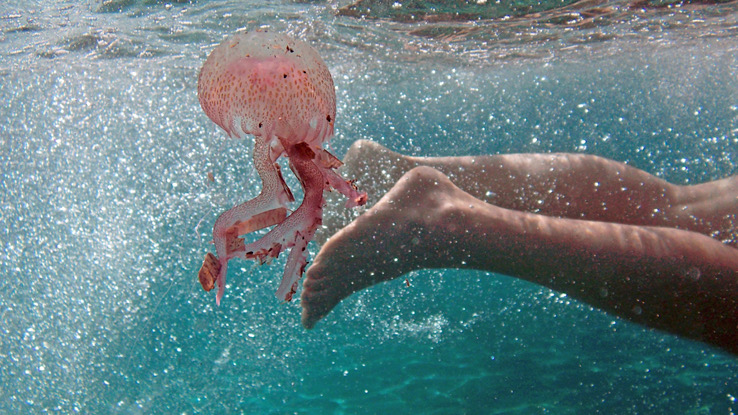
Jellyfish stings are a common problem encountered by beachgoers every year. When the jellyfish’s long tentacles (nematocysts) come into contact with your skin, thousands of tiny barbed stingers inject venom. This typically results in immediate stinging/burning pain and redness; however, other symptoms often occur as well. Read on to learn about five other common jellyfish sting symptoms and how to treat them.
Tracks on the Skin
There may be red, brown, or purple “tracks” where the jellyfish tentacles made contact with your skin and left many tiny stingers. These tracks may look similar to a string, cord, or rope and may remain for several weeks, depending on the severity of the sting.
Immediately apply salt water to the sting — do not apply fresh water. Then, use tweezers to remove any visible stingers from the area. Smaller stingers can be removed by applying either shaving cream or baking soda paste and then scraping it off once dry. It is important to deactivate all stingers as soon as possible to reduce any later symptoms. You can also apply vinegar to the affected area to help alleviate the stinging/burning sensation.area to help alleviate the stinging/burning sensation.
Swelling
Swelling is common after a jellyfish sting because the venom elicits an immune reaction and inflammation. Over-the-counter drugs, such as ibuprofen, naproxen, or aspirin, can be used to reduce this inflammation and also alleviate any pain. Applying an ice pack may also help reduce swelling and pain.
Rash
A delayed skin rash may develop after a jellyfish sting due to hypersensitivity to the venom. You can treat the rash with over-the-counter oral antihistamines or hydrocortisone cream. Seek medical attention if a severe rash occurs. Your doctor may prescribe corticosteroids to treat the rash and other associated symptoms.
Itching
Jellyfish stings may itch even after removing the stingers, and the pain subsides. You can use calamine lotion, lidocaine, hydrocortisone cream, or any other anti-itch ointment to alleviate any itching. Avoid scratching the area because this may worsen symptoms or cause bleeding. Any additional damage to the skin can also lead to an infection.
Allergic Reactions to Severe Stings
An allergic reaction to a jellyfish sting may require immediate medical attention. People who get severe stings should also see a doctor as soon as possible. Symptoms of severe reactions include blistering, numbness, nausea, vomiting, headache, muscle weakness or spasms, difficulty breathing, chest pain, and difficulty swallowing.
Resource Links:
- “Jellyfish Stings” via Mayo Clinic
- “Jellyfish Stings” via Cleveland Clinic
- “Jellyfish Stings” via Hurwitz Clinical Pediatric Dermatology





